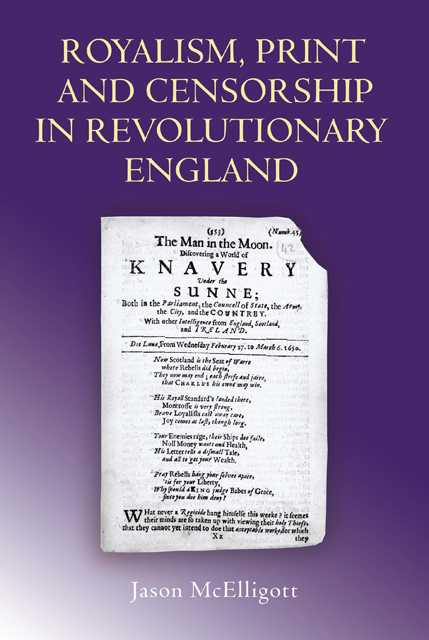Book contents
- Frontmatter
- Contents
- Illustrations
- Acknowledgements
- Abbreviations
- Introduction: Royalism and its Problems
- 1 Royalists and Polemic in the 1640s
- 2 The Politics of Sexual Libel
- 3 The Twists and Turns of Royalist Propaganda
- 4 Authors, Shifting Allegiances and the Nature of Royalism
- 5 Printers, Publishers and the Royalist Underground
- 6 Hunting the Royalist Press
- 7 The Theory and Practice of Censorship
- 8 A New Model of Press Censorship
- Conclusion
- Select Bibliography
- Index
Introduction: Royalism and its Problems
Published online by Cambridge University Press: 10 March 2023
- Frontmatter
- Contents
- Illustrations
- Acknowledgements
- Abbreviations
- Introduction: Royalism and its Problems
- 1 Royalists and Polemic in the 1640s
- 2 The Politics of Sexual Libel
- 3 The Twists and Turns of Royalist Propaganda
- 4 Authors, Shifting Allegiances and the Nature of Royalism
- 5 Printers, Publishers and the Royalist Underground
- 6 Hunting the Royalist Press
- 7 The Theory and Practice of Censorship
- 8 A New Model of Press Censorship
- Conclusion
- Select Bibliography
- Index
Summary
The neglect of royalism
This is a study of a remarkable set of royalist newsbooks produced in London during the late 1640s. Books of weekly printed news – known to contemporaries as newsbooks – had first appeared in London during the turmoil of late 1641. They quickly found a ready audience and by the summer of 1644 there were a dozen titles in production in the capital and at the royalist headquarters in Oxford, catering for a broad range of political and religious positions. Newsbooks became commonplace during the First Civil War but the royalist titles examined in this book were remarkable because they were published between 1647 and 1650 in conditions of strict secrecy in London, a city which was, in effect, under enemy control. This fifth-column of polemicists provided a fascinating, continuous commentary on some of the most momentous events of the century, including the Second Civil War, Pride's Purge, the regicide, and the Cromwellian invasion of Ireland. They also shed light on aspects of popular culture, print-culture, clandestine printing, propaganda, the theory and practice of censorship, gender history, the history of London, as well as the politics and nature of royalism.
In total, more than 530 issues of fifty-one separate titles were published. Many titles survived for only a few weeks, but a number of them appeared regularly over a period of months or even years. Scholars have long been aware of these newsbooks, but until recently they have been entirely overlooked as a historical source. In recent years a number of studies have paid some passing attention to the contents of these underground publications, but we still lack a study of these newsbooks in their own right. How and why were they produced? How were they distributed? Who read them? Who wrote, printed and published them? What were their aims, and what arguments didthey put forward in an attempt to secure these aims? How did the authorities in the capital react to their appearance? How did many of the titles survive for long periods, and how did the authorities, who had struggled to control them for so long, finally suppress them in the early summer of 1650?
- Type
- Chapter
- Information
- Publisher: Boydell & BrewerPrint publication year: 2007

